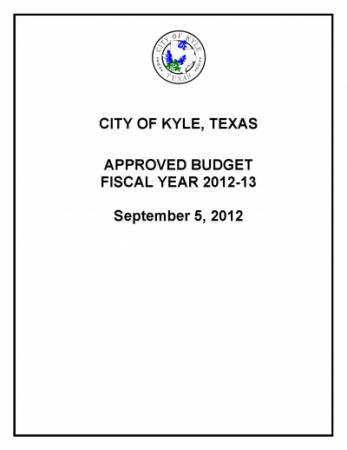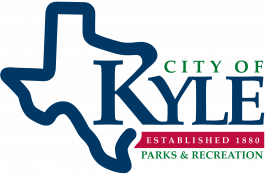Kyle City Council Finalizes Budget for 2012-2013
After months of work by city staff and numerous public workshops and public hearings, the Kyle City Council has approved the City’s Budget for Fiscal Year 2012-13. The budget totals $41.64 million allows for all City programs and services to continue at their current levels. The budget was approved on first reading at the regularly scheduled City Council meeting on Tuesday, September 4th. The second reading of the budget was conducted during a special called meeting of the City Council on Wednesday, September 5th. Both reading passed on 4-2 votes with Mayor Lucy Johnson, Mayor Pro Tem Diane Hervol, and Council Members David Wilson and Samantha Bellows-LeMense voting for the budget. Council Members Ray Bryant and Bradley Pickett voted against the budget at both readings. Council Member Becky Selbera was out with an illness for both readings.
“Developing and passing a budget that covers all the needs of the city while keeping taxes and utility rates at a reasonable rate is the most important job of the City Council,” said Kyle Mayor Lucy Johnson. “The council and city staff worked very hard for many months to craft this budget, and as difficult as it is to raise taxes and utility rates, we believe that it was necessary to bring our revenues more inline with our expenses. We’ve gone over every line item in this budget and it is as lean as they come.”
The budget includes an increase in property taxes of $0.0399 per $100 of valuation, bringing the total property tax assessment to $0.5244 per $100 of valuation. The additional revenue generated by the tax increase is estimated to raise an additional $555,509 and will fund increases in the City's debt service obligations, additional funding requirements brought on increases in fuel, public safety and personnel costs. Additionally, the tax increase will allow the City to decrease the amount of money transferred from the City owned water utility by $300,000, create an "Emergency Reserve Fund" as called for the City's new Debt Management Policy by funding $350,000 into the fund, and allow for a 3.5% cost of living adjustment for City employees.
“City staff have gone a number of years without a meaningful wage increase and without adding any new personnel or equipment,” said Johnson. “Although we are not in a position to add people or equipment, we did feel that a moderate wage increase was due. I would like to thank our city staff for their dedication, diligence and for making due with what they have to keep our city safe and beautiful.”
The City Council approved adding a part-time animal control officer who will cover some nights and weekends. The City currently has only one animal control officer.
The budget also allows for the hiring of two full-time and one part-time dispatcher for the police department to relieve overtime for the department’s communication staff. Funding for these positions comes from reallocating funds from a currently vacant police officer position. The only other new position is for an additional motorcycle officer to be used in the traffic control division of the police department.
The City Budget for 2012-2013 also includes a 20% increase in water and wastewater rates for all City of Kyle Water Utility customers. This increase represents the second year of the City’s three-year plan to bring the utilities rates to a level that covers its expenses. The utility did not have a rate increase for 10 years prior to raising rates in the 2011-2012 budget.
The City Council conducted 5 public workshops that included 20 public hearings on various parts of the budget and presentations from City staff.
“Public input is a huge part of the budget development process,” said Mayor Johnson. “The council realizes that the money we authorize to be spent comes from our citizens, and we want them to know that we spend that money as thriftily as we can. We also realize that the public has expectations as to what services are delivered. Those services cost money and we work very hard to balance the expectation of low taxes with the expectation of service delivery and the value of that service.”





